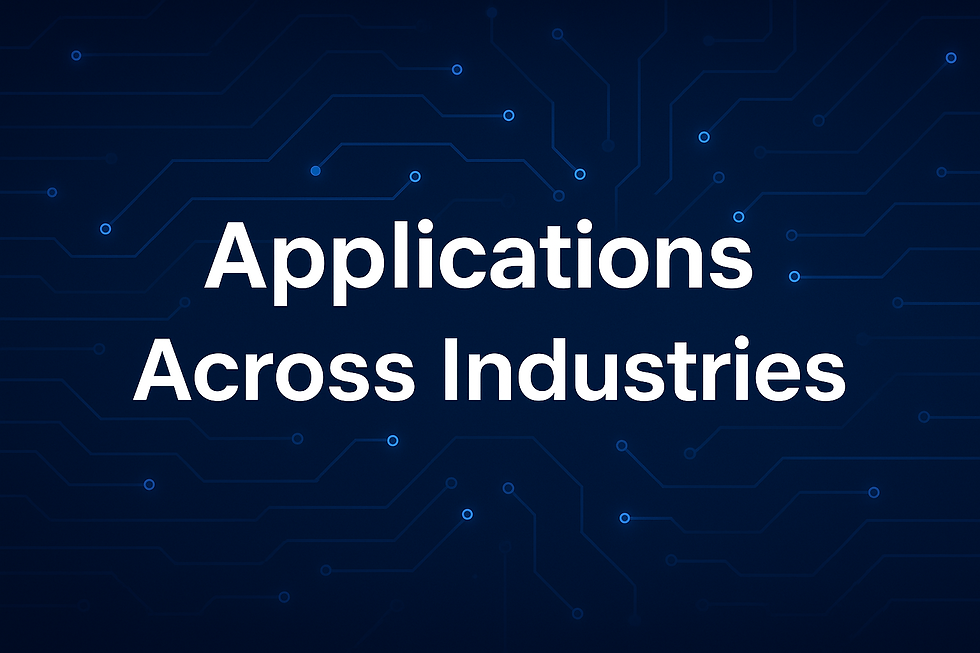Agentic AI: The Next Stage of Autonomous Intelligence
- abhaysuman60
- Jul 28, 2025
- 4 min read
Artificial Intelligence has evolved rapidly over the past decade. From rule-based systems to deep learning models, we've seen machines learn, predict, and even create. But in 2025, a new phase is gaining momentum: Agentic AI. This new paradigm focuses on autonomous agents capable of decision-making, goal-setting, and independent action, marking a significant departure from traditional reactive AI systems. As businesses and developers grapple with the next frontier, Agentic AI promises to redefine automation, productivity, and innovation across industries.
This blog explores what Agentic AI is, why it matters, and how it could change the landscape of digital technology in the coming years.
What is Agentic AI?

Agentic AI refers to AI systems that act as autonomous agents. Unlike earlier models that respond to specific prompts or inputs, agentic systems proactively pursue goals, adapt to dynamic environments, and make complex decisions with minimal human intervention. They are not just reactive but intentional, learning from their environment and continuously updating their strategies to optimize outcomes.
These systems often include:
Goal-oriented behavior
Environment-aware learning
Continuous feedback loops
Memory and long-term planning
A simple example is a personal AI assistant that not only schedules your meetings when asked but also rearranges them proactively if it detects scheduling conflicts or priority changes.
Why Agentic AI is Gaining Attention in 2025
Several developments have pushed Agentic AI into the spotlight this year:
Advances in LLMs and Multimodal Models: The success of GPT-4o, Claude, and other frontier models has laid a strong foundation for reasoning and comprehension capabilities.
Rise of Tool-Using Agents: Systems like AutoGPT and BabyAGI demonstrate how agents can integrate APIs, databases, and third-party tools to complete end-to-end tasks autonomously.
Enterprise Use Cases: Companies are now deploying agentic systems in customer service, finance, and operations to boost efficiency and cut costs.
Hardware and Infrastructure: Improvements in compute power, edge devices, and cloud-native architecture make it easier to deploy agentic systems at scale.
Core Capabilities of Agentic AI
To better understand the power of agentic systems, let’s break down their core capabilities:
Autonomy: The ability to operate independently without continuous human supervision.
Adaptability: Learning from feedback and changing environments to improve performance.
Intentionality: Setting and refining goals over time.
Coordination: Collaborating with other agents, systems, or humans.
Reasoning and Planning: Creating multi-step action plans to achieve objectives.
These capabilities allow Agentic AI to be not just reactive tools, but proactive partners.
Applications Across Industries

Agentic AI is finding applications in nearly every sector:
Healthcare: Personalized health agents that monitor patient data, predict complications, and suggest treatments.
Finance: Autonomous portfolio managers and risk assessment bots.
E-commerce: AI agents that handle inventory, customer inquiries, and personalized recommendations.
Manufacturing: Predictive maintenance bots and adaptive process controllers.
Education: Learning companions that tailor content and pacing to individual student needs.
Marketing: AI agents capable of running and optimizing ad campaigns autonomously.
Benefits of Agentic AI
Increased Productivity: By automating decision-making and execution, businesses can scale operations faster.
24/7 Operations: Agentic systems don’t need breaks and can operate continuously.
Better Customer Experience: With personalized and proactive service.
Cost Efficiency: Reduced need for human oversight and repetitive labor.
Scalability: Agentic AI systems can handle increasing complexity with minimal resource addition.
Challenges and Considerations
Despite its promise, Agentic AI comes with a unique set of challenges:
Ethical Concerns: How do we ensure agents align with human values?
Security Risks: Agents with access to systems and data can be targets for attacks.
Interpretability: Understanding how agents make decisions is crucial for trust and accountability.
Control and Oversight: Balancing autonomy with safety.
Addressing these challenges requires robust AI governance frameworks, continuous monitoring, and transparent system design.
Future Outlook
The coming years will likely see Agentic AI evolve in three major directions:
Agent Ecosystems: A network of specialized agents collaborating to accomplish tasks.
Human-Agent Collaboration: Systems designed to work alongside humans, not replace them.
Agent App Stores: Like mobile apps today, users may soon download agents tailored to specific use cases.
Governments, enterprises, and developers will all play a role in shaping how these systems are built, used, and regulated.
Conclusion
Agentic AI marks a transformative shift in how we interact with technology. Moving beyond tools and assistants, these intelligent agents represent a new frontier in autonomy, learning, and innovation. Whether you’re a business leader, developer, or tech enthusiast, now is the time to explore how Agentic AI can drive value in your domain.
To discover how WhizzMe is leveraging next-gen AI technologies, visit WhizzMe to explore our cutting-edge solutions and insights.
Frequently Asked Questions (FAQs)
What makes Agentic AI different from traditional AI?
Agentic AI systems operate with autonomy, setting their own goals and adapting to change, whereas traditional AI is typically reactive and requires specific input to function.
Can Agentic AI replace human jobs?
While some repetitive tasks may be automated, Agentic AI is best viewed as a collaborator that enhances human capability, not a full replacement.
Is Agentic AI safe to use?
With proper governance, testing, and transparency, Agentic AI can be safe. However, security and ethical considerations must be prioritized.
How can businesses implement Agentic AI?
Businesses can start by identifying use cases where autonomy and adaptability offer the most value, then piloting agentic systems in controlled environments.
What skills are needed to work with Agentic AI?
Key skills include AI/ML development, prompt engineering, API integration, and understanding of human-computer interaction.




Comments